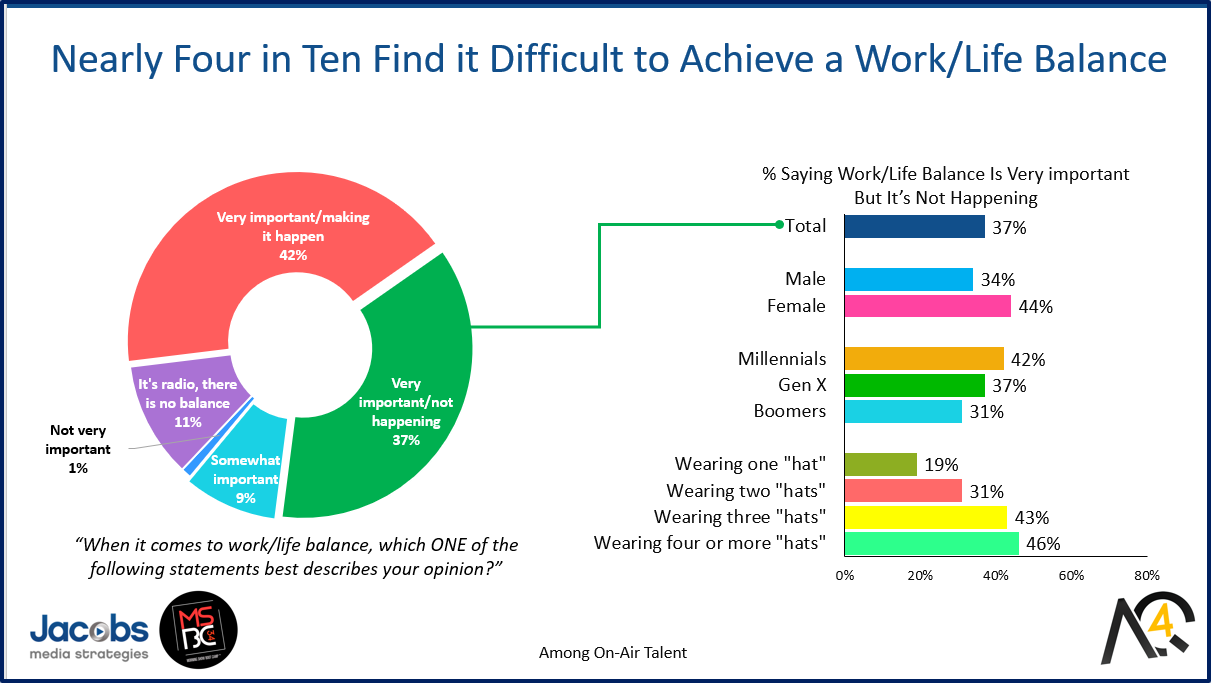
August
Like clockwork, it happens around this time every year. Like all those countdowns, solicitations from countless charities, and resolutions, it’s the “Best of JacoBLOG” until early next month. I’ve gone back into the data archives and pulled the posts you read most. After reviewing this group of popular stories and articles, it also occurred to me most elicited a lot of comments. Maybe they will again this second time around.
I hope you enjoy reading them – for some of you again, but for many of you, for the first time. It’s been another crazy year, and I hope that for all of you, 2023 is a better journey around the sun.
Today’s “Best of” post goes back to last August, and a new term in our at-work vernacular – “quiet quitting.” It took off in office and personal conversations, typifying the tension between employer and employee in our post-COVID reality.
So how’s YOUR job going? -FJ
Remember that scene in the 1992 film A League of Their” Own where the grizzled manager of a woman’s baseball team during World War II, Jimmy Dugan, has a moment with one of his players, Mae Mordabito, during an intense moment in the game.
That manager is Tom Hanks, and the emotional player is Bitty Schram:
So, let’s go on the record right here and now:
There’s no “quiet quitting” in radio.
In just the past few weeks, the term has taken off, showing up just about everywhere where work from home and work-life balance issues are being discussed.
Every year, Merriam-Webster – the dictionary people – run a word search to determine “the word of the year.” You won’t be surprised to learn that in 2020, the word was “pandemic.” Last year, it was “vaccine.”
And for 2022? It just might end up being “quiet quitting,” a new phrase that’s taken on major significance in our changing workplace. I’ve seen a number of different definitions for the term.
LinkedIn career guru, Blair Heitmann looks at it this way:
“For many, it’s a way to achieve better work-life balance, and is the latest move away from hustle culture. It could mean seeking some more appropriate boundaries at work, like leaving work on time every day, or it could mean saying no to projects outside your job description, or outright refusing to answer emails and team messages outside of working hours.”
“Hustle culture?” That describes pretty much every one of the literally hundreds and hundreds of radio stations I’ve had the pleasure walking into since the start of my career back in 1970s radio.
In a new Lifehacker article by Brianne Hogan, we learn there’s another side of “quiet quitting” – when you’re no longer motivated by your job or you’re simply unhappy at work.
Is “quiet quitting” a new condition, spurred by the Great Resignation (another popular 2022 term) or have employees been doing a version of on-the-job sandbagging for centuries. How many among us have simply played out the weeks and months of a miserable job while they “quietly” look for something better.
But is the so-called “work-life balance” the real deal? Many experts call it an unattainable goal that only serves to frustrate workers and their bosses. In fact, Entrepreneur lists 10 myths about the concept, suggesting there’s no such thing as a balance between our work and home lives.
call it an unattainable goal that only serves to frustrate workers and their bosses. In fact, Entrepreneur lists 10 myths about the concept, suggesting there’s no such thing as a balance between our work and home lives.
They believe that attempting to segment your life by allotting a certain number of hours to the work and personal sides just doesn’t work.
Particularly in radio.
My first radio instructor, Jim Respress, started every one of his classes with a prophetic piece of advice about what it means to be a broadcaster:
“In radio, time is your biggest enemy.”
I can’t tell you how many times his words have reverberated in my head over these many years. And especially now, when time is of the essence in an industry where we can’t seem to move quickly enough to adapt and transform.
To gain understanding about what it all means to those who make their living behind the mic, we crafted a new question in AQ4, our survey of air talent. We asked our 750 on-air personalities and producers about how successful they’ve been at achieving a “work-life balance.”

Four in ten say equilibrium between their time at the station and their lives at home is important and they’re pulling it off. If that’s you, congratulations.
But a similar sized group would love a balance but say it just doesn’t happen. And the talent most apt to feel frustrated are women, Millennials, and those who wear a lot of “hats” – that is, are responsible for several jobs.
But then there are my favorite people – the 11% who say “It’s radio – there is no work-life balance.” They’re the realists – the ones who just know this new workplace condition – “quiet quitting” – has nothing to do with their lives.
As the industry knuckles down for another round of layoffs and RIFs, more and more radio professionals are likely going to have that conversation with “the man (or woman) in the glass.” Those introspective moments are important at any stage of your career, but perhaps even more these days. In our post-pandemic world, many of us have some thinking to do about what we really want and what we’re willing to endure in order to achieve it.
I seriously empathize with anyone in the business who no longer has the stomach for it, or who feels like they signed up for a different radio industry.

But I would also hope that if that describes you, and you’re “quiet quitting” while you plot out your next move, you speed it up. At this key moment for the radio broadcasting industry we need everyone to be “all in” for radio – whether you’re on the air, selling ads, or in the corporate suite.
If you’re playing a game of “rope-a-dope” with your station while you wait out the rest of the year, maybe it’s time to move over, Rover, and let someone new who’s motivated and amped up take over.
Apparently, no one subscribes to the Johnny Paycheck School of Broadcasting anymore. That was when you clearly suggested what your GM could do with his or her job.
Taking up space while you’re looking for “what’s next” may indeed by in vogue. But speaking for those putting in overtime as they try to do their level best to keep their stations on the air and in the black, move over and let someone have your job who’s not debating their life or career trajectory at the moment.
“Quiet quitting” may end up being this year’s most looked up term when all is said and done during the December holidays. But for the radio business, there’s nothing the least bit fashionable about it. There’s nothing “quiet” about radio. And a key reason many fell in love with radio way back when is radio’s exuberant, over-the-top, in-your-face attitude.
There’s no “quiet quitting” in radio.
- Media And Technology In 2025: Believe It Or Not! - April 18, 2025
- In Radio, You Just Never Know - April 17, 2025
- The Secret To Making A Great Podcast (And Great Radio) - April 16, 2025





To All Terminally Touched by RF: Keep ’em flying and our creativity will return the new best for our industry. Thank you, Fred.
Those RIFs are painful parts of a business that’s never been long on stability and security. Most of us knew what we were getting into, Clark. But that doesn’t make it any easier.
It seems like Elon Musk agree with your comments. He said not long ago: “Twitter will need to be extremely hardcore” in order to succeed. “This will mean working long hours at high intensity. Only exceptional performance will constitute a passing grade.”
Am I wrong?
Clearly, Musk is pushing back against WFH, “quiet quitting,” and the “work / life balance.” And I think that’s why many employers are quietly rooting for him to succeed.
Nothing quiet about your sales commission paycheck. You sell, you collect, you get paid every two weeks. A terrific system, write your own raise this month, next month, any month! What more could be fairer?
Ah, Leo, us “old schoolers” often long for the good old days. But I also remember clients becoming “house accounts,” client shakeups, and changing commission rates because (some) sales reps were making too much money. That said, your paycheck was (mostly) a reflection of your hard work (and your PD’s skill). Thanks for the comment.
Hey, Fred. Like most things in radio, it all started with the passing of the Telecommunications Act in 1996. General Managers who worked their butts off running an AM/FM combo now had to run a ‘cluster’ of up to 8 stations. Programmers who specialized in certain formats now had to program more than one station and learn all formats. A jock who, for years did middays for one station had to do afternoons and nites for others in the clusters. Salespeople now had to sell up to 8 stations. How about engineers who had to keep up to 8 stations on the air? Oh… and all of this extra work for the same money? Fast forward to today. This is the job. If you can’t handle all of this, then this business today ain’t for you. It’s not going to change. This business model is here to stay. Happy Holidays!
You’re spot-on, Joe. Most roads lead back to ’96. It’s a tough environment out there for those who’ve been RIFed or those still employed in radio.
My guess is that radio’s current business model won’t last, Radio can’t continue like this – generating less and less revenue and continually cutting costs to offset those losses. At some point, there won’t be enough income to cut around, while the ever dwindling group of employees get paid less and less to do more and more. There will be a point where the tradeoff won’t be worth it to enough talented people for radio to keep them – and Radio will have to find ways to generate more ears and eyes profitably, or face a slow slide to irrelevance.
AS for there being no quiet quitting in radio…that may not be entirely true. During 2021, I made a couple of small radio buys for two unrelated entities. There was no way to leave a message for the iHeart or Cumulus clusters in Dallas. To be fair, I got a returned call from a Cumulus rep who picked up my number from caller ID, but was never able to connect with iHeart. The Cumulus rep quoted me $1000/spot for just one of their country stations, which was nothing close to a serious or competitive offer. There was no way to connect with iHeart Austin either, but every other cluster (Public or otherwise) was either reachable on the fly or got back to me promptly.
At least in sales and in one market, there was some quiet quitting going on. One could also suggest that there’s been some quiet quitting afoot for years in radio’s V and C suites, but that’s for another rant.
Happy, merry and joyous holidays to all!
Thanks for the savvy (and snarky) comments again this year, Bob. Best to you and yours.